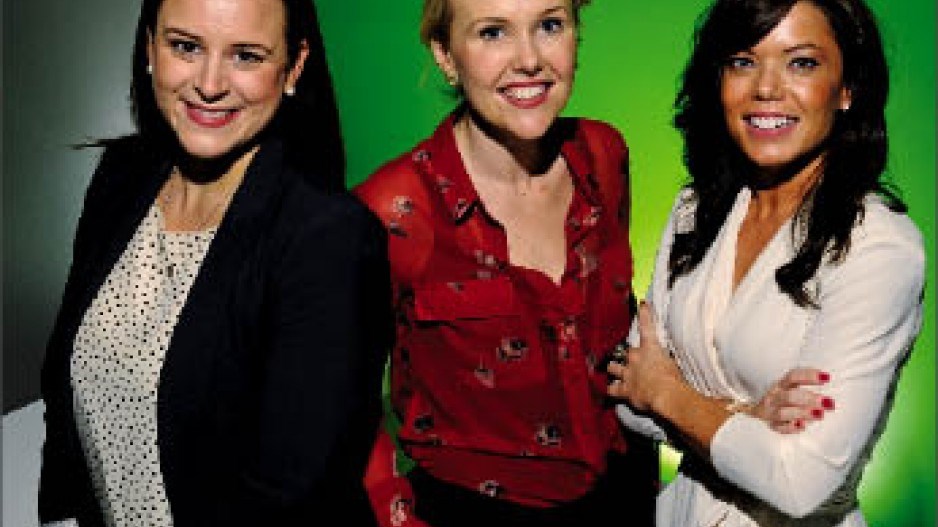Complementary business strengths, an aligned desire to innovate and a catalyzing real estate opportunity were key factors that pushed boutique public relations firms Pereira PR and Spark PR and Publicity Inc. to sit down in March and discuss a merger.
?We individually realized that both companies were getting to a point where in order to get to the next stage, not necessarily in terms of physical growth but in terms of what we wanted to accomplish in the industry – working together would be an incredible thing,? said Pereira founder Sara Padidar, née Pereira.
More than half a year later, that conversation has culminated in the formation of merged PR company Talkshop Media, which just launched publicly with a staff of 12.
But before plunging into the deal, Padidar, along with Spark founders Katie Dunsworth-Reiach and Beth Boyle, hired Vancouver entrepreneur and consultant Judy Brooks to help them assess the whys and hows of a merger.
All three founders already knew and trusted Brooks, who co-founded and sold three companies, including Blo Blow Dry Bar Inc. and corporate conflict resolution firm ProActiveResolutions Inc. and is a director of Small Business BC and board member of the Forum for Women Entrepreneurs.
To expedite merger conversations, Brooks first looked through both companies? financial documents and got all three founders to do some soul searching.
?I sent them a list of questions [including], ?What would you love to do?? ?What do you not want to give up?? ?What do you think you?re best at?? ?What would make you excited???
The founders and Brooks proceeded into three ?intense? half days of merger discussions, spaced out over a number of weeks, to allow for reflection.
With Brooks? guidance, the companies tackled key questions such as valuation and control. On paper, the two companies? revenues matched, ?almost down to the dollar,? according to Dunsworth-Reiach, but Padidar was a 100% owner of her company, while the Spark founders shared theirs 50-50.
But Brooks contended – and the founders came to accept – that ownership of a service-based company isn?t worth much beyond the skills and talents of its owners.
?You?re led to believe when you start a small business that your blood sweat and tears is worth something, and it?s kinda not; it?s only worth what it is in that moment,? Brooks said. ?Unless you have a widget that stands on its own, it?s just what?s in the bank.?
That logic would undergird the eventual merger deal that saw no cash exchanged and ownership in the new company distributed equally between all three partners.
Padidar, who relinquished the most control in the deal, saw the merger as the chance to strike out into different and better territory in the PR market.
?I wanted to work in a situation where we would be creating something or doing something that was truly different.?
Beyond the big-picture questions, Brooks helped the founders break down and assess the mechanics of a merger.
?She broke it down into the priorities: legally, what are the things you have to do to merge; financially, what are the things you need to do to merge,? Boyle said.
?That?s huge for a company. You typically don?t get given it. You sort of have to make the mistakes along the way or go out and seek it.?
Brooks guided the founders through topics such as role division and how to structure a partnership agreement to accommodate partners? business and personal goals while keeping a company sound.
?I think for each of us, a business goal was starting more businesses, and partnership allows you to do that because it opens up a window of time or the bandwidth,? said Dunsworth-Reiach.
?We have that worked into our partnership agreement: you get a Sabbatical, you can just take off and do whatever you want for a set period of time, which could be having a baby or it could be starting your next million-dollar venture.?
But through it all, Brooks said, the defining question of the merger wasn?t about details.
?Really to me, the big question was, ?How are you all going to feel???
After taking a hard look at the case for a merger, all founders opted in. With the plan communicated to all employees, the companies moved into their new digs on West Georgia Street in May. They moved in as separate entities with the intention of creating a unified company.
In Vancouver?s limited office real estate market, the new space offered both companies an expanded space in the downtown core – but one that, without the merger, would have seen them compete in close quarters.
From there, the founders began merging their teams on various projects and distilling best practices for the new company. Talkshop launched officially to its staff in July and to clients a week later.
The founders said top merger priorities were to keep clients and staff happy throughout the process – a plan which, Dunsworth-Reiach said, Talkshop has achieved.
?Those two things are singing along, better than we could ever have imagined.?
Now, the Talkshop founders say they?re hard at work on a key merger goal: new – and as yet undisclosed – company directions.
And Padidar said already, the merger is delivering results.
?We?ve already seen, just in the limited time that we?ve been going out and talking about our new team, that we?re attracting a different kind of client – maybe not in the size or type of business, but in what they?re coming to us for and what they know they can come to us for.? ?




